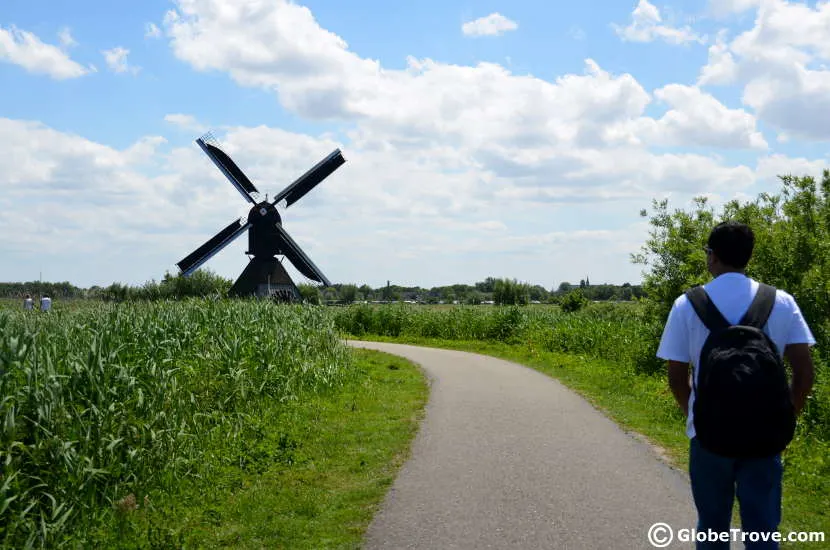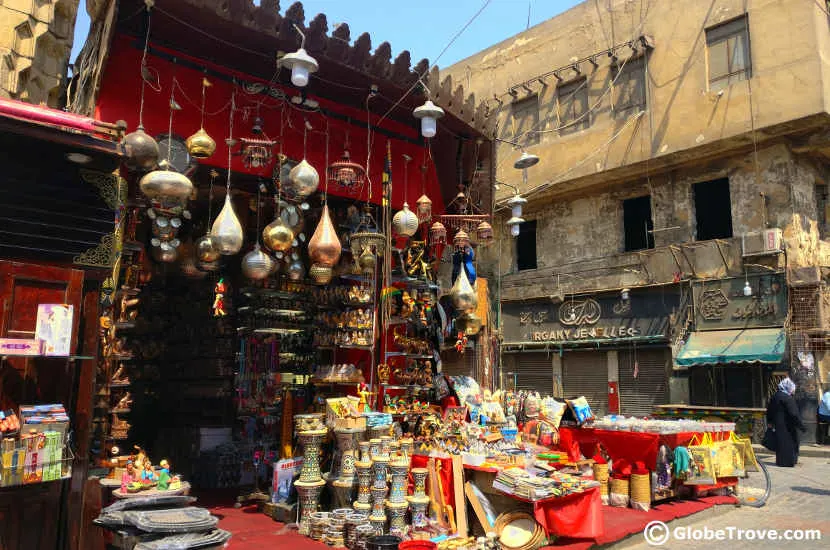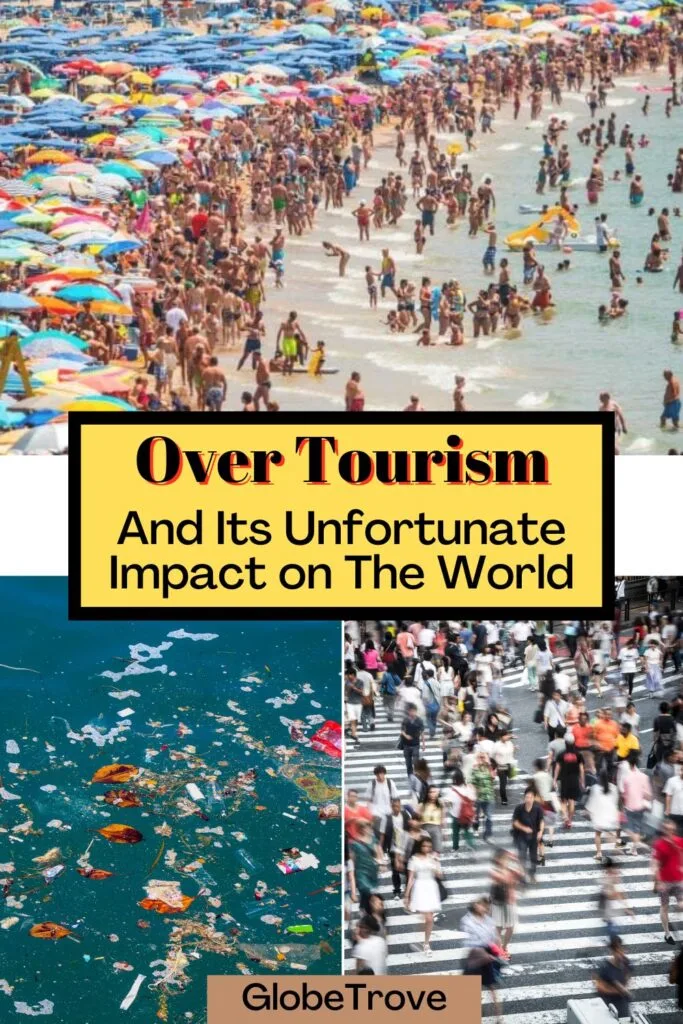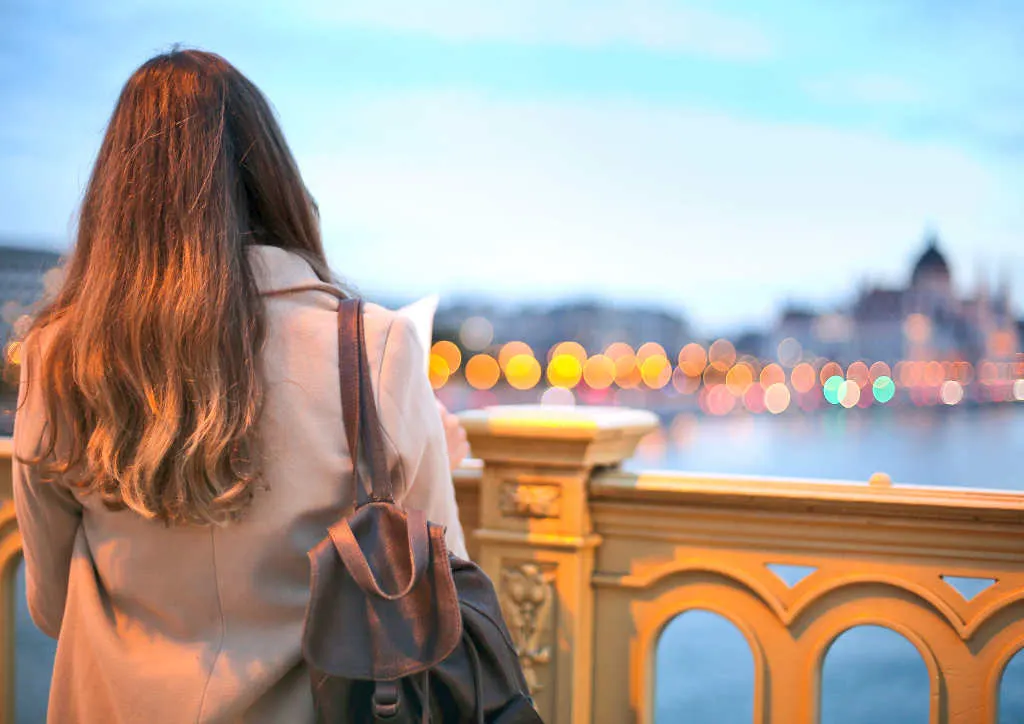I hadn’t really thought much about overtourism till recently and that in itself is odd because in retrospect, I have seen the effects of overtourism as I have been moving around the world for the past few years. I guess that is largely because I was always wrapped up in my own excitement and the crowds were just an annoyance.
On my recent trip to Indonesia however, I found myself standing in humongous queues and for the first time ever, it struck me how big a problem overtourism is and how easy it is to be ignored.
This post may contain affiliate links. As an Amazon Associate, I earn a small commission from qualifying purchases at no additional cost to you. Read my disclaimer for further information.
Table of Contents
So What Is Overtourism?
With the advent of cheaper airfares and consequently travel becoming popular, a lot of people are heading out to see the world. Places like the Taj Mahal, Eiffel Tower, Colosseum, the Pyramids of Giza and so many other landmarks have always made it onto people’s bucket lists for years.
This means that when people head out for their holidays, they are very likely to include these popular spots in their itinerary.
Popular tourist spots across the world have become inundated with the rise of tourism. It leads to all sorts of problems from increase in cost of living to lack of resources. While the tourists see these effects of overtourism, it usually does not make as much an impact in their lives as it does to the local people living there.
Europe in particular has been affected by overtourism to a large degree. If you were thinking about heading here during the peak season, I would urge you to look at the alternatives to avoid overtourism in Europe.
This post may contain affiliate links. As an Amazon Associate, I earn a small commission from qualifying purchases at no additional cost to you. Read my disclaimer for further information.
The Effects Of Overtourism
Let’s talk about the impact or effects of overtourism on the world around us. To do that, pause for a second and think about where you are now. Think about the last time you visited a famous city or a famous monument.
What were the problems that you faced? Chances are some of those issues will have arisen from the large number of tourists visiting the area.
Rise In Cost Of Living
Ever found yourself complaining about how expensive it is to visit places like Paris? Stop and ask yourself what the locals must feel. You probably know that both Shawn and me both come from a state called Goa in India.
Over time and as the state gained popularity, tourists from all over India flocked to it for the white sandy beaches and (sadly!) the alcohol. I’m not going to deign to talk about what many Indians say they go to India for because it riles me up.
Anyway, getting back to the point, the rise in these tourists landed up leading to a lot of large corporations buying up land for resorts. The prices of food skyrocketed and so did the cost of accommodation. Speaking of accommodation, let’s head over to another well-known effects of overtourism.
Rise In The Cost Of Accommodation
When I talk about the rise in cost of accommodation, I am not talking about how much you pay when you visit a city. A couple of decades ago, going on a holiday meant booking a hotel. With the rise of Airbnb that all changed. While Airbnb may have brought the price down for the tourists, it did not always have a good impact on the lives of the locals as would be expected.
The Guardian published an article where it talks about how renting out a room meant making some extra money for the locals. As time progressed however the number of Airbnb listing went up. This now meant that people were buying properties to rent out on Airbnb but weren’t always staying in them.
Now as can be imagined, the demand for new properties lead to the increase in the property prices forcing the locals in the area into a rather difficult position. Many could not afford to live in the areas that they did before and had to move to cheaper areas. This can be seen in popular cities across the world.
Sanitation Issues
We recently headed to Nusa Lembongan and Nusa Penida which are small islands off the coast of Bali, a popular tourist hub. While taking a boat over to the islands one of the first things that we noticed was the amount of trash in the water.
At a later date, I managed to strike up a conversation with a local from the island and I was told that most of the trash came from Bali and floated over to the island.
Apparently, the locals on Nusa Lembongan were once a seaweed farmers. Lack of knowledge on how to dispose trash meant that they used to dump it in the sea. It poisoned their farms and when that happened the locals began to change their ways.
Today while they are no longer seaweed farmers, they are conscious that polluted beaches means that tourists won’t visit so they head out on clean up rounds every morning. The issue however is that the trash comes in from neighboring Bali and the reason is the influx of tourists.
The island cannot handle its trash. Sadly this is one of the effects of overtourism that can be seen at all popular tourist spots. It is also a reason why we need to be more conscious about the disposable items we use.
Damage To The Cities Themselves
Another issue that comes to the forefront as one of the effects of overtourism is the damage that the cities themselves occur. For decades Venice has been trying to attract tourists. The tides however have turned (pun unintended).
Today the city suffers from too many tourists. The Guardian talks about how environmentalists claim that cruise ships are responsible for damage to the underwater supports of the historic buildings. The pollution that comes along with it is also a source of concern.
Environmental Impact
While we have been talking about the effect to the city and the locals, we haven’t even delved into the environmental impact that overtourism has on the world around us. For one thing, cheaper flights have made it possible for people to hop from city to city in a relatively short time frame.
Europe in a week tours are just one example. The increase in demand for flights means that there are more planes in the air than ever before.
In 2017 alone, 859 million tonnes of Carbon dioxide were produced by flights across the world and over 4.1 billion people were carried by airlines. This is only set to increase and by default, the carbon dioxide emissions will also increase. You can read more details about the facts at ATAG.
That is the impact of just the airplanes alone. The rise of use of speedboats to ferry tourists across to different islands has lead to the widespread destruction of coral. This can be seen in Maya bay in Thailand. Even the highest mountain peaks of the world are not immune to it.
Mount Everest suffers from overcrowding! Would you believe that the mountain has a girdlock because of the number of climbers? That has lead to another problem: The disposal of waste. This isn’t just food waste and plastic that is carried up. It is also human excrement.
According to CNN, porters schlepped around 28,000 pounds of waste from the base camp to the dumping site. If you don’t know how much that is, imagine the weight of two full grown elephants!
Now I wish that the problem would stop there but it doesn’t. The dumped waste is placed in open pits where they hope that it will dehydrate and shrivel. The problem however lies in the fact that the risk to the contamination of ground water and the rivers is high.
What Is Being Done By Governments To Curb The Effects Of Overtourism?
While the term overtourism is a new one, the problem has been growing for a long while. Its effects are becoming more and more prominent. A couple of governments across the world have taken steps to curb the effects of overtourism but a vast majority of them have yet to wake up. Here are a couple of actions that have been taken till date and a few that have been proposed.
Shutting Down Of Popular Sites
Maya Bay is one of the most popular attractions in Thailand and it saw around 2.5 million visitors in 2018! They also expected the numbers to increase by half a million every year . That is a lot of tourists for one tiny bay! The end result was the large scale damage to coral and sea life in the area.
The Thai government acted and closed the bay indefinitely so that the sea life could recover which I feel was a very good move. In addition to this, they also planted around 23,000 new coral but it is left to be seen if the rising temperatures will bleach those coral too.
Thailand has not been the only country that has closed tourist spots. Philippines closed Boracay island from the 26th of April to the 26 th of October 2018. This was done in order to repair and restore the island which to quote the president had become a ‘cesspool’. There are even plans in place to ensure that the island has a cap on visitors. It is left to be seen if this gets implemented.
Cruise Ships
We already talked about how cruise ships were affecting the city of Venice. In a decisive move, Italy is in the process of banning large cruise ships from entering the Venice city centre which I am given to understand will take place only by 2021. The question however is whether it will be a little too late.
The Dutch government on the other hand has levied a day tourist tax for transit sea and river cruises that have been moored in the municipal boundaries of Amsterdam. The flat fee of $9 per person per day is now causing cruises to rethink and even skip the port of Amsterdam.
Change In Advertising Strategies

Doesn’t this spot look gorgeous? We took this photo at a place called Kinderdijk which is a day trip away from Amsterdam. You would be surprised to learn that only a small percentage of the tourists that visit Amsterdam head here?
Forbes published an interesting article about the Dutch tourist board recently. The Netherlands tourist board have begun putting a plan together to encourage fewer tourists and not more! This is largely because of the projected rise in tourists that are expected in the upcoming years with Amsterdam being their prime location.
The city is suffering from overcrowding and litter making the lives of the locals difficult. Even the beloved tulip fields have not been spared with visitors trampling the tulips and the farmers being left with no option other than to erect barriers.
The Netherlands tourist board does not aim to discourage tourists but encourage them to move to lesser visited areas instead and relieve the load on the Dutch capital.
Tourism Tax
Venice is making another bold move. A tourism tax for everyone who visits the city. The tax is supposed to be 3 Euros per person and is expected to rise to as much as 10 euros per person in three years. It also aims to turn things around by 2020 where every tourist will have to book to enter the city and anyone who tries to circumvent this can get fined as much as 450 euros.
The tourist tax is also expected to reflect which season the tourists are travelling in with the high tourist season being most expensive. The plan however does come with its own set of flaws. A lot of the locals who moved away from the city because of the problems of overtourism may find themselves paying a tax to visit their relatives which doesn’t seem fair either.
What Can We Do To Ensure That We Don’t Contribute To The Effects Of Overtourism?
While the governments of different countries across the world need to start doing their part, it is important to understand that we as individuals also need to evaluate the way we travel. Are there ways in which we can ensure that we do not contribute to the problem at hand or at the very least reduce our impact?
Sustainable Travel
Sustainable travel has become a popular phrase in todays world but what is sustainable travel and how does it pertain to our conundrum about overtourism?
Sustainable travel is traveling in a way that minimizes your impact on the environment around you. It involves numerous methods which can be taking fewer flights and using public transport instead wherever possible.
Using eco friendly products like sunscreens without chemicals that damage coral or not using plastic. There are many ways in which you can tweak the way you travel but I am not going to talk about them here because I would land up going on a tangent.
Raise Awareness
One of saddest realizations that I have come upon is that there is a lack of awareness. Without awareness change cannot be brought about. So talk about overtourism and its impact on the world around us. That is the first step towards change.
Encourage people to ask questions and to in turn pass the awareness along. Remember, a lot of practices aren’t around because of malice, it could also be because of the lack of understanding.
Support Local Businesses

Supporting local businesses and visiting local markets can make a difference.
Remember how we talked about the locals getting affected by overtourism? Well one aspect of their suffering also revolves around the rise of large conglomerates. These larger companies tend to attract all the customers forcing the local establishments out of business.
One great way of countering this ill is to make sure that you support the local businesses while you travel. It could be something simple like dinning out to buying souvenirs.
Reduce The Trash That You Produce
Trash has become a major problem across the world. It is important to realize that in places like Rome, Bali, Paris and the likes this problem is exacerbated by the number of people who pass through the area every day. Reducing the trash you produce can help in a big way.
Simple things like carrying your own bag, avoiding disposable containers, using portable soap and shampoo bars can make all the difference.
Travel Bloggers Talk About Their Views About The Effects Of Overtourism
As travel bloggers I believe that we influence the way people travel either directly and indirectly. That’s why I asked a couple of my fellow bloggers to weigh in with their opinions about the effects of overtourism.
They have some interesting perspectives that I would highly recommend reading through as they will provide insight into how people across the world are making their way towards a better world. I hope that their words will inspire you just as these amazing bloggers continue to inspire me every day.
Cory talks about how she and Gregely (G.) have made a conscious choice to embrace sustainable travel.
Being a sustainable traveller takes a little adjustment but once you do it, life becomes so much better. For example, when we visit a new city we walk and rely on public transport as much as possible. For long distance travel, we use our car, which offsets our carbon footprint versus both of us flying.
We went vegan to become healthier but to also help combat animal cruelty and fight climate change. We have a fully sustainable range of organic travel clothes. We avoid single-use plastic where possible and use a reusable water bottle for our travels.
We recycle our clothes and only buy new items when necessary. We cook our food from scratch and avoid processed food. That helps local fruit and veg producers and ensures better quality food. We don’t visit zoos or any animals in captivity. We believe animals should roam free and it is our duty to respect our environment.
And finally, we avoid all palm oil products. We strive to eat as little fat as possible either way, but we only purchase products which have olive oil in them and some coconut oil if it cannot be avoided (I’m looking at you vegan cheese).
Susanna talks about how she avoids popular tourist spots.
It is our job as travelers to do research to find out what locations are buckling from the negative impact of tourism and go somewhere else. In recent years, I have begun avoiding major European cities, such as Amsterdam, and places with delicate natural ecosystems, like the overcrowded Machu Picchu trail, in order to get off the beaten path.
I also never visit a place as a day trip and have begun to travel at a slower pace to reduce the harms of flash mass tourism and ensure I am putting money back into the local economy. I want to remind everyone that it is okay not to go to popular travel destinations. There is so much beauty in the world, go see something not many people have seen before – explore your own backyard.
Teja talks about how she avoids being drawn into the FOMO
I think being an introvert, plus a contrarian, makes me relatively resistant to FOMO. This then naturally ‘vaccinates’ me from contributing too much to overtourism. Whenever a place becomes too popular, such that everyone ‘has to go’, I get turned off from it. I am attracted to the obscure, the untried.
If a place always get visitors in one part of the year, I always wonder, what does it look like in the other part – the place or time that isn’t so popular? For instance, I trekked Annapurna in the wane of the monsoon season instead of the season more favoured by proper mountaineers, and discovered a very different highland, clad all in green and elfin mists.
Some places will tend to draw more people than others, by its sheer awesomeness. I’m thinking UNESCO sites. But many others are just ‘trending’. Ultimately, a lot of overtourism is driven by who we have become today. It can be abated when we lose this culture of travelling to ‘keep up’ with peers, and have more self-driven and lasting motivations.
You’d then choose places that truly resonate with you, perhaps travelling fewer times and for longer each time. Let’s put it this way: you just don’t have Tinder hook-ups with places that matter – you want a long conversation, keep in touch, and perhaps make lasting bonds.
Have you noticed the effects of overtourism when you travel? Has it made you change your plans or have you changed the way you travel?
Tell us about your thoughts and views. We feel this is a topic that should be discussed and inputs on how we can change the way we travel to combat overtourism are always welcome.

*This post contains Affiliate links


Katy
Saturday 8th of June 2019
Such an important read, you made some really good points. It will be interesting to see what actions are taken my world governments as the years go by! x
Penny
Saturday 8th of June 2019
I'm keeping my eyes open to see what changes the governments across the world make. At the same time I believe that it is important for us to start towards change as individuals. As travellers the onus is on us too.
Alice | Girl with a saddle bag
Saturday 8th of June 2019
This is such an important topic, and one that I've been increasingly growing aware of over the past few years. So many places which might have seemed 'off the beaten path' ten years ago are not any longer. And having recently visited Amsterdam, I can vouch for it being unpleasantly busy in places. We're trying to think a little more imaginatively about where to head, and starting to favour less popular but outstandingly lovely places, like the Alps in summer. As a rule of thumb, the harder it is to reach, the more peaceful it is, and its surprising how many public transport options there can be to rural areas.
Penny
Saturday 8th of June 2019
It is amazing how many gorgeous places in the world are undervalued and undervisited. It is equally astounding how troves of people flock to the popular sites. Harder places to reach tend to have lesser tourists just like you said but visiting them is pure bliss. The simplicity of the surroundings, the respite from the crowds and you actually get to indulge in the local cultures. Overtourism seems like such an unnecessary problem when you think about it but it is a problem and one that we need to tackle quickly.
Julie
Friday 7th of June 2019
Great read! This is so important. Having grown up in areas that are near big tourist attractions, I've noticed the difference in the last 20 years of how crowded things are and the effect it's had on locals. I hope that the more we talk about it, the closer we get to a solution.
Penny
Friday 7th of June 2019
I hope so too Julie. It is interesting to note that the governments across the world are beginning to take notice and to try and take action.
Rika | Cubicle Throwdown
Friday 7th of June 2019
I lived on a small Caribbean island that started getting more and more cruise ship traffic while I lived there, and so I have seen these impacts first-hand. Very few of the tourism dollars were getting into the hands of the locals. This is a great read!!
Penny
Friday 7th of June 2019
I guess when you see its impact first hand, you begin to realize how important change is. When I look at my small home state on the coast of India and compare it to the decades gone by, I find myself at the point of tears. The change has been devastating and I honestly believe that people who travel need to be educated about the effect of their actions. Sadly, not everyone listens and very few care.
ZanetaBaran.Com
Friday 7th of June 2019
It is such a great article. It is so important to talk about these kind of topics. I didn't think about it too much in the past. Happily, recently I started looking more into eco friendly behaviours and minimalism. It seems to be all connected.
Penny
Friday 7th of June 2019
It is surprising isn't it? I began to realize just how interconnected everything is when I started writing about overtourism. While awareness isn't at its peak, I can see a change as more people start talking about its impact on the world around us. Hopefully, there will come a time when everyone actively tries to make a change.